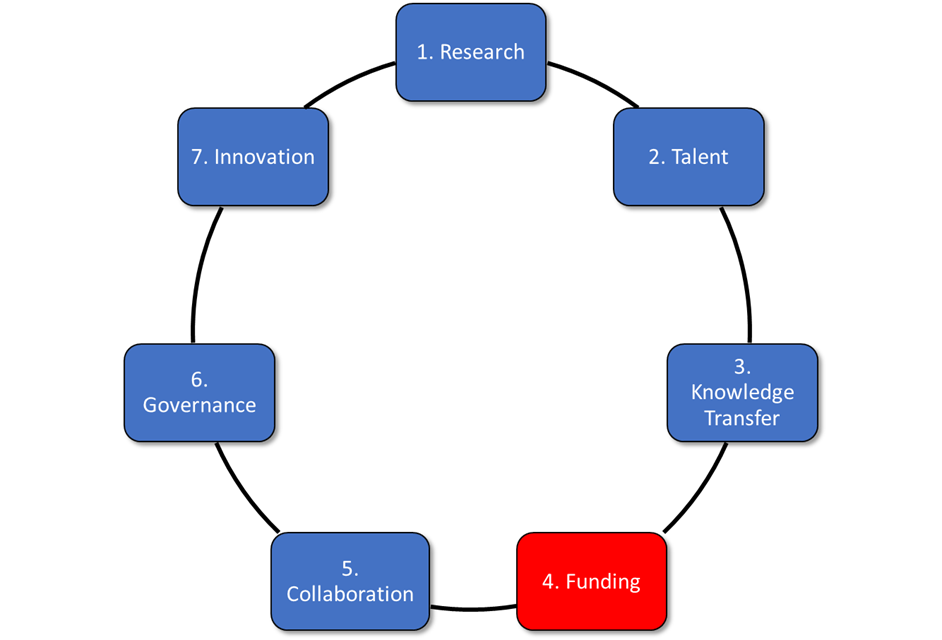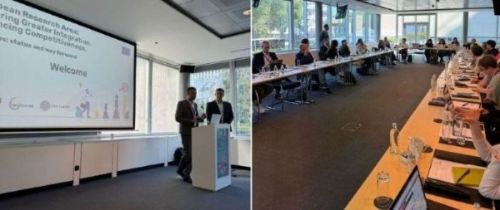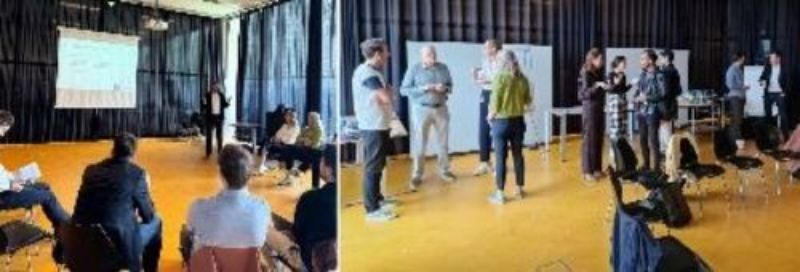| Hello Kevin, |
|
This is the COOPERATE newsletter with the latest information about the COOPERATE project, which during the next months (2022-2024) will define and pilot the ERA Hubs, one of the ERA policy actions defined by the Council of the European Union for the next years. Building on the vision and success stories developed within the EuroTech Universities Alliance and their R&I ecosystems, the COOPERATE partners will contribute to the future development of the ERA Hubs as a key European flagship to promote R&I ecosystems.
Follow the COOPERATE LinkedInpagina for the latest ERA-hub news.
|
|
Line of Action 4: Funding
|
|
COOPERATE aims to facilitate the harmonisation of research practices and sharing of best practices across member states, promoting a more seamless and efficient research environment within the ERA Hubs network. To aid ecosystem players such as educational institutions, local industry, policymakers, and other stakeholders, a framework for nurturing dynamic ecosystems has been developed in the so-called ‘Playbook’.
In each of the upcoming newsletter one of the seven lines of action will be further elaborated with concrete tools that can be employed by an ecosystem towards the implementation of the ERA Hub framework model. This edition: Funding.

Funding
In the pursuit of scientific advancement and innovation, funding plays a pivotal role in nurturing and sustaining a robust research ecosystem. The availability of soft funding and further funding options is crucial for fostering a culture of research excellence and driving impactful innovation.
The ERA Hubs framework recognises the critical role that funding plays in supporting scientific endeavours and catalysing breakthrough discoveries. Soft funding, characterised by its flexibility and agility, serves as a valuable resource for researchers, enabling them to push the boundaries of knowledge, unlocking new insights and driving innovation across various fields. Similarly, the availability of further funding options is paramount to sustaining the momentum of scientific progress, allowing projects to scale up and transform into tangible solutions with societal impact.
Funding serves as a critical factor in building a strong research and innovation ecosystem. Soft funding provides researchers with the flexibility to explore new ideas, while further funding options enable the scaling up and commercialisation of promising research projects. By fostering collaboration, supporting early-career researchers, and facilitating the pursuit of high-impact innovation, funding is the driver of the scientific excellence that will position Europe at the forefront of global research and innovation endeavours.
Recommendations
These recommendations can help a research and innovation ecosystem establish a robust and diversified funding structure that supports the growth and success of projects, fosters collaboration, attracts private investments, and maximises the social and environmental impact of research and innovation activities.
- Build relationships with investors and venture capitalists for additional funding
- Develop a strategic plan for funding allocation and prioritisation
- Provide training and assistance in grant writing and proposal development
- Explore opportunities for funding projects with social or environmental impact
- Implement robust monitoring and evaluation mechanisms for informed funding decisions
- Encourage a public-private mix in funding
- Establish partnership funds and corporate sponsorship programmes
- Encourage risk willingness and support for start-ups
- Enable cascade funding
- Support early-career researchers
|
|
Call for Champions: Open call for emerging R&I ecosystems
|
The COOPERATE project invites emerging Research and Innovation (R&I) ecosystems to participate in its Call for Champions, offering an opportunity to advance your ecosystem toward becoming a ERA-Hub. Through the Call for Champions, the COOPERATE project will support two ecosystems in enhancing collaboration, knowledge exchange and maturity as part of the European Research Area (ERA).
The two ecosystems, which will be selected based on a series of criteria, will benefit from:
- Support and guidance provided by the COOPERATE consortium in their progress as ecosystem: this includes the support in the assessment of the maturity of the ecosystem and the identification of actions that can help the ecosystem make progress taking into consideration the needs of the actors involved. Through this process, the ecosystems will have the opportunity to better define their orientation and mission as well as concrete next steps for further development.
- Direct involvement in the reflections to define and apply the ERA-Hubs concept in future EU policy.
- Networking opportunities within their regions as well as with other EU ecosystems and R&I stakeholders through the co-creation sessions.
- Increased visibility at European level and within the ERA community.
This call is open to universities or organisations closely linked to them, active in the field of knowledge valorisation, such as a Knowledge Transfer Organisation (KTO), Technology Transfer Office (TTO), a university-based incubator or other academia-based intermediaries.
The required documentation must be submitted by 30 October 2024 at 29:59 (Brussels time) via email cooperate.era@gmail.com, with the following email object: “Application Call for Champions”
For more detailed information on the Call for Champions, the Eligibility & Evaluation criteria and the Application, Evaluation and Selection process, please refer to the full Call for Champions text which can be downloaded and accessed through here.
|
|
''ERA Hubs: Status and Way Forward''
|
On 19 September 2024, as part of the European Research Area: Fostering Greater Integration. Advancing Competitiveness conference hosted by the European Commission, the COOPERATE and ERA_FABRIC projects teamed up with ERRIN network and organized a successful event in Brussels, titles “ ERA Hubs: Status and Way Forward”, with 40+ participants from 38 organizations.
During this dynamic session, we explored the concept of ERA Hubs. ERA Hubs are designed to strengthen regional innovation ecosystems, foster collaboration, and break down silos between public and private sectors. The goal? To empower regions to take a larger role in shaping R&D policies and investments across Europe.
Key takeaways:
- Clarification on the role of ERA Hubs in driving knowledge-driven innovation at a regional level.
- Valuable insights from high-level speakers including representatives from the European Commission and Member State representatives within the ERA Forum.
- Agreement on the potential of ERA Hubs to connect stakeholders, boost competitiveness, and support a more integrated European Research Area.
We are thrilled by the active participation and fruitful discussions, setting the stage for the future of innovation and regional development through ERA Hubs in Europe! Stay tuned for more updates as we continue to shape the way forward together.

|
|
|
|
On September 10, COOPERATE had a Dutch pilot workshop with local stakeholders from VDL Groep, Philips, HighTechXL, Fontys University of Applied Sciences, and researchers, policy advisors, and educators from Eindhoven University of Technology. The workshop took place at the Eindhoven University of Technology.
With the participants we discussed the seven lines of action: Research, Talent, Knowledge Transfer, Collaboration, Funding, Governance, and Innovation, and how they affect regional semiconductor and health ecosystems. What are successes? What are challenges? And what role can ERA-hubs play in strengthening these ecosystems?
Key takeaways:
Semiconductor Industry
- Common Goals: Focus on circular economy and talent attraction drives collaboration.
- Clear Roadmap: A roadmap supports coordinated innovation across the industry.
- IMEC’s Role: IMEC facilitates knowledge sharing and collaboration.
- Challenges: Knowledge retention is hindered by privacy issues, and attracting talent remains a key challenge.
- Civil Society: Uncertainty on how to involve civil society in collaborations.
- ERA Hub’s Role: Can help secure talent, funding, and strengthen interregional collaborations to prevent talent drain.
Health Industry
- Trust: Trust among organizations is key to innovation and collaboration.
- Education & Industry: Close ties support talent development and retention.
- Social Awareness: Drives innovation by pushing knowledge creation.
- Challenges: Scaling healthcare innovations is difficult due to market size and data sharing limitations.
- ERA Hub’s Role: Can support scaling and policy alignment by connecting regions.
 |
|
| Upcoming events and co-creation sessions |
IIn the next coming month a series of events, gatherings and other happenings will take place that are related to the COOPERATE project and the ERA-hub concept. Below they are summarized:
- WIRE: Week of Innovative Regions in Europe conference, Budapest, Hungary (13-14 November 2024): On November 13th, COOPERATE will participate as a speaker to present the project. The discussion will focus on the need for and importance of ERA-Hubs in fostering European cooperation. Additionally, the conference will enhance the visibility of both the ERA-Hubs and the project itself. Click here for more information.
- WOIC: World Open Innovation Conference, University of California, Berkeley (6-7 November 2024): On November 6th-7th, COOPERATE will host a workshop to provide insights into the project, explore the connection between the playbook/toolbox and the self-assessment, and share additional policy recommendations. Click here for more information.
|
|
| COOPERATE is funded by the European Commission H2020 Research and Innovation Programme under grant agreement 101095017 and call identifier HORIZON-WIDERA-2022-ERA-01-30. |
 |
|